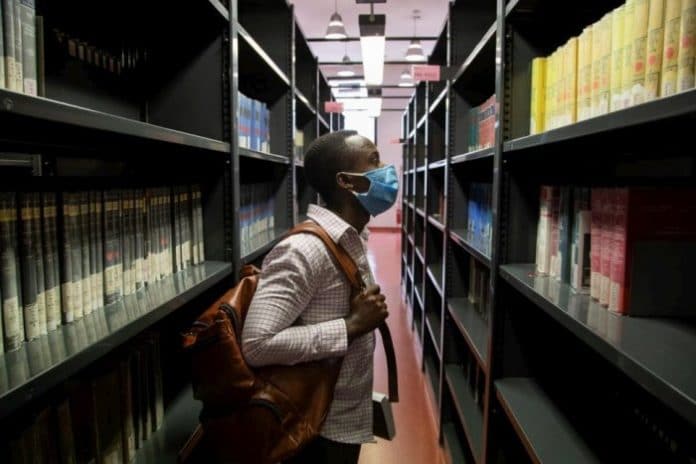Refugees able to pursue their dreams of higher education through the University Corridors programme return to their communities equipped with skills and knowledge.
“These are my thoughts and prayers,” says Jules, smiling as he points to a wall of hand-scribbled notes and quotes in his comfortable studio apartment a few steps away from the central Piazza della Signoria, in the heart of Florence. “I write down whatever inspires me, it helps me stay focused.”
When Jules, a Congolese refugee living in Ethiopia, received the news that he had been accepted to do a master’s degree in natural resource management at the University of Florence, he Googled the city. Now, over a year into the programme, he can confirm his first impression of a beautiful, welcoming city were correct. “My faculty is really very inclusive. There are so many other international students from all over the world studying with me, I have learned as much from them as from the courses themselves,” he says.
“My tutors are incredible people that have supported me above my expectations; they have become like family.”
Just months after Jules was born in the Democratic Republic of the Congo, both of his parents were killed in ethnic clashes and he was taken in by his aunt’s family in Goma, North Kivu. Fighting in the region continued to escalate, and the family lived under the constant threat of violence. “You get used to this life, but there comes a day when you think ‘I am not going to wait here to die’, and so we left,” he says.
After a complicated journey, he and his family arrived in Ethiopia where they were registered as refugees and housed in Sherkole Refugee Camp. “In the camp they measured salt in a little cup; there was no sugar, no nothing, we learned to make meals out of imagination, but I was happier than I if I had enjoyed a big meal in Congo. At least I could sleep with both my eyes closed – there was peace, and I was safe,” he recalls.
Only after some time living in the camp was Jules able to start thinking about his future. He was worried that as a refugee he might never get the opportunity to continue his education. “I used to see people who had recently graduated [from university] return to the camp, maybe two or three people a year. They were respected members of the community, everyone looked up to them and turned to them for advice. I knew I wanted that for my life as well,” he says.
Thanks to his determination and a scholarship through the DAFI programme, Jules was able to enrol at Ethiopia’s Gambella University some years later. There, he became interested in agriculture, particularly the small-scale farming and fishing practised by the local community. He observed how they struggled during periods of drought, which over the years had become longer and more severe. “Just waiting for the rain to come back was the normal thing to do, but I thought that with better knowledge and technology those communities could address drought periods differently, to be self-reliant all year round.”
When he heard about the University Corridors for Refugees programme (UNICORE) from a friend, he applied with few expectations. “The chances of being selected for one of the scholarships offered was so, so far away,” he recalls. “When I received the email from the University of Florence … I was stunned into silence, I was just overwhelmed by happiness.”
UNICORE aims to increase opportunities for refugees living in Ethiopia to continue their higher education in Italy through a partnership between Italian universities and the UN Refugee Agency, UNHCR. It forms part of UNHCR’s broader goal of creating safe routes for refugees to be able to fulfil their dreams for a better future without having to risk their lives on perilous journeys.
“Refugees need opportunities like this.”
Only 5 per cent of refugees manage to enrol in higher education compared with an average of 39 per cent among the general population. Together with its partners, UNHCR is aiming to ensure that 15 per cent of refugees can access higher education by 2030.
After starting in 2019 with a pilot phase, the UNICORE project has since grown to offer a total of 70 scholarships at 28 universities across the country. In 2021, 45 refugees secured scholarships to pursue degree courses in Italy.
Jules is set to graduate this summer. He plans to go back to his community and use his newly gained expertise to help refugees and locals sustain themselves without outside help, even as the climate becomes drier and more unpredictable. “Refugees need opportunities like this,” he says about his scholarship.
“The more refugees have skills, the more they can support themselves. They need knowledge to have a voice, to be empowered, and also to be able to dream again.”

